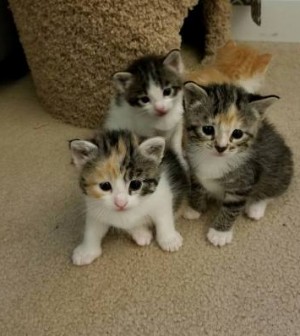- Do you subscribe to Dharma Dog Training’s Newsletter? You should.
- A Unique Campaign from The Humane Society of the United States
- Rabid bats in Omaha- Stay safe, prepared with these tips
- Springtime Activities in Omaha
- Mill Dog Monthly from Bailing Out Benji
- World Spay Day, Legislative Alert in Nebraska
- Attend the Nebraska Rescue Council’s monthly meeting this Saturday
- Five Hard-to-Ignore Reasons to Adopt!
- Paws in Pink to Benefit Breast Cancer Foundation
- VCA, Inc. Acquires MidWest Vet Specialists from Kansas State University
Misinformation about feral cats perpetuates dangerous myths

On Tuesday night, Feb. 7, 2019, the Ralston city council used part of its session to address its feral cat population and how to solve fighting between feline advocates and those opposed to the work they do. Those opposed to the cats and their keepers were mollified by a bit of education- a lack of which caused the “mess” in the first place.
There are a handful of cat colonies in Ralston where animal lovers work to feed felines, immunize, and practice trap-neuter-return techniques that help keep the feral or “community cat” population down. The meeting last night in Ralston addressed what was happening in the Ralston Park colony near 84th and Park Drive.
Feral advocates provide food and water for cats in the Park, but one man has been sabotaging efforts by dumping what’s been left for the felines. He also has been covering paths cats use to access the food and water. His concerns, reported here, are that the animals could be rabid, that the cats attract wild animals, and that harm could come to domestic animals and children in and around the area.
The colony has only a handful of feral cats, down from a dozen last year. Cat advocates attribute the lower number to trap-neuter-return programs. The Nebraska Humane Society assists with these programs in an attempt to control feral populations where traps are placed, cats are trapped and altered, then returned to live in their colonies without the ability to produce more kittens.
Larry Shackman of Feline Friendz helped us understand myths he and his group deals with- the same ones held by the Ralston man who has been dumping food left for cats.
Myth: They’re diseased
First, it’s important to know that most diseases a cat can carry are specific to its species. A dog, for example, can’t get feline leukemia from a feral cat. The Ralston man who headlined the city council meeting Tuesday stated this: “My problem is you got kids running around the park, and there’s all these cats running around. Maybe they don’t have rabies, maybe they don’t have any diseases, but who’s to know?”
Shackman encouraged us to check with County health organizations to verify, but estimates there hasn’t been a rabid cat report in Douglas County for 50 years. We know from covering the community over the years that the only rabid animals in our area have been bats. Periodically, we hear of cattle or critters, but not of cats with rabies.
Also, trap-neuter-return programs include vaccinations for common feline diseases.
Myth: They’ll attack domestic animals or children
Feral cats can be told apart from domestic cats, as Shackman says, in that a feral cat will let you know he’s feral by running the other way. Feral cats are secretive and keep their distance, as a general rule. They want to attack you as much as you want to get attacked, which is to say not at all.
Myth: They attract wild animals
There are wild animals all around us. If there are cases where raccoons or possums are attracted to a space like Ralston Park, it’s because there’s food, not because there are cats. Shackman says that proper practice is to feed during the day, pulling food at dark when animals like raccoons are out and about.
As a result of the council meeting, Mayor Don Groesser directed his the city attorney to work with the Humane Society to draft an ordinance on feral cats to be presented later to the council. It was indicated that the policy “would likely mirror Omaha’s ordinance.”
An ordinance is certainly better than no ordinance, but Shackman would like to see it updated from the form in which Omaha adopted about a decade ago. Ferals are “community cats” in name today and a nuisance complaint often results in euthanasia rather than trapping, neutering, and returning cats. Shackman would like to see Ralston’s ordinance reflect current language and practices to keep cats safe.
“Most of these issues are a result of irresponsible cat owners,” Shackman told us. “Whatever is going on, it’s almost never the cats’ fault.”
If you’d like to learn more about trap-neuter-return programs, adopt a cat, learn about cat colonies, or speak with a feline advocate from Feline Friendz, click here.
Latest News
-
3 Tips for Pet Owners on Training Rescue Dogs
Owning a rescue dog can take some work compared to...
- Posted 1 week ago
- 0
-
Choosing the Right Pet for Your Lifestyle
Are you thinking about getting a pet but unsure what...
- Posted 3 weeks ago
- 0
-
How to Make Your Rescue Pet as Comfortable as Possible
Did you bring home a new pet from a shelter...
- Posted 1 month ago
- 0
-
How Having A Pet Can Change Your Life
Having a pet can open your heart in ways that...
- Posted 7 months ago
- 0
-
How To Improve The Life Of Your Senior Pet
Do you have an elderly fur baby and want to...
- Posted 7 months ago
- 0
-
Springtime Activities To Enjoy With Your Furry Friends
Are you preparing for warmer weather and want some ideas...
- Posted 8 months ago
- 0
-
Pros And Cons Of Microchipping Your Pets
Have you considered whether your pets should be microchipped and...
- Posted 9 months ago
- 0


















You must be logged in to post a comment Login